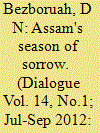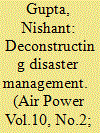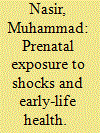| Srl | Item |
| 1 |
ID:
117115


|
|
|
| 2 |
ID:
139192


|
|
|
|
|
| Summary/Abstract |
Jammu and Kashmir (J&K) was once again in the news for devastation and intense trauma associated with hundreds of unnatural deaths. This time, the cause was not the commonly known beast of terrorism and / or cross border attacks, rather the damage was caused by nature’s fury in the form of unprecedented floods and inundation. The scale of intensity of extreme weather incidences like the J&K flood repeatedly being out the inadequacies in the country’s disaster response capabilities
|
|
|
|
|
|
|
|
|
|
|
|
|
|
|
|
| 3 |
ID:
127294


|
|
|
|
|
| Publication |
2014.
|
| Summary/Abstract |
A nation-wide survey was conducted in 2010 to investigate the Australian public's attitudes to nuclear power in relation to climate change and in comparison to other energy alternatives. The survey showed a majority of respondents (42%) willing to accept nuclear power if it would help tackle climate change. Following the disaster at the Fukushima Daiichi Nuclear Power Complex in Japan, an event triggered by the 11 March 2011 Tohoku earthquake and tsunami, it was expected that support for nuclear power in Australia would change. In light of this, a follow-up survey was conducted in 2012. Indeed, the post-Fukushima results show a majority of respondents (40%) were not willing to accept nuclear power as an option to help tackle climate change, despite the fact that most Australians still believed nuclear power to offer a cleaner, more efficient option than coal, which currently dominates the domestic production of energy. Expanding the use of renewable energy sources (71%) remains the most popular option, followed by energy-efficient technologies (58%) and behavioural change (54%). Opposition to nuclear power will continue to be an obstacle against its future development even when posed as a viable solution to climate change.
|
|
|
|
|
|
|
|
|
|
|
|
|
|
|
|
| 4 |
ID:
179958


|
|
|
|
|
| Summary/Abstract |
Simultaneous exposure to natural calamities and conflict shocks is a phenomenon that has been largely understudied. The interplay between natural disasters and conflict shocks can have adverse effects extending beyond the current family members to children in utero. The current paper tries to fill this gap by investigating the impact of floods on pregnancy and birth outcomes across conflict-affected and unaffected districts in Pakistan. Using mother fixed effects strategy, the results suggest that in-utero exposure to violence during flood increases the probability of small birth size by 4.7 percentage points. Moreover, simultaneous exposure to flood and violence increases the probability of miscarriages and stillbirths by 6 and 1.9 percentage points, respectively. Significant heterogeneities are found across income groups and education levels.
|
|
|
|
|
|
|
|
|
|
|
|
|
|
|
|